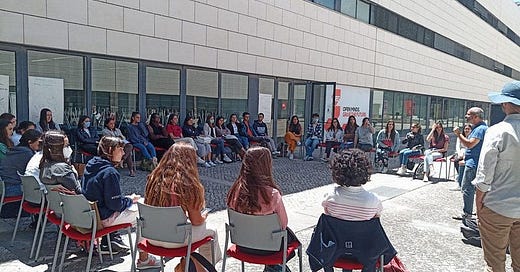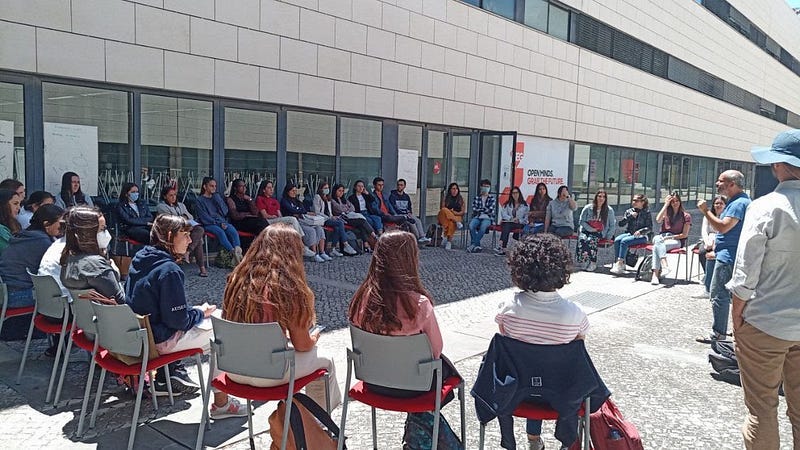PM+RD @ ISEG
(EN bellow) No dia 27 e 28 de Junho, o Gil e Marco, participamos na Skills Up Week do ISEG no módulo de Teamwork. Em 3 sessões de 2h…
(EN bellow)
No dia 27 e 28 de Junho, o Gil e Marco, participamos na Skills Up Week do ISEG no módulo de Teamwork. Em 3 sessões de 2h, desenhamos uma experiência para cerca de 50 participantes universitários (cerca de 2/3 mulheres e média de idades por volta dos 20) poderem experienciar:
Cultura responsável e regenerativa
Trabalho em equipas organizadas em círculo, entre pares, com responsabilidade em ‘Eu’ e não em ‘Nós’
Possibility Management
Desenvolvimento Regenerativo
Métodos participativos e colaborativos em acção
Para assinalar a mudança de pensamento, escolhemos fazer no exterior, em contacto com os elementos naturais. Foi a primeira aula no ISEG.
Trabalhámos em grande círculo, com o grupo todo, a pares, em equipas (grupos entre 2 a 7 pessoas) focadas em temas que importam para os participantes e ligados ao ISEG. Usamos tomada de decisão por consentimento.
Foi uma experiência de vermos o PM+RD em ação. Desenhámos usando mapas e distinções dos dois gameworlds, tornámos o sistema consciente de si próprio usando constelações (mapeamentos) do grupo nos temas da sustentabilidade e trabalho em equipa assim como convidámos todos a fazer um exercício (um “jogo”) que permitiu criar o “gap” necessário para haver vontade e propósito de navegar connosco durante as sessões (sendo também um elemento de ligação entre as sessões) assim como nutriu, de forma não linear, a realidade experiencial que fomos promovendo e permitindo apresentar diversos ‘mapas de pensamentos’ e ‘distinções’ dos gameworlds do Possibility Management (PM) e Desenvolvimento Regenerativo (RD).
Com os mapas sobre os níveis de responsabilidade (PM) e níveis de pensamento em sustentabilidade (RD) estabelecemos as bases para a cultura responsável e regenerativa em que o trabalho em grupo assentou. O mapa do trabalho em equipa (PM) tornou visível os limites da cultura atual e qual o edge atual em exploração.
Com uso dos 4 sentimentos, em particular das distinções sobre a raiva (PM) foram criados grupos (de 2 a 6 pessoas) em temas em que os participantes estavam interessados e eram importantes para si, temas como ‘gestão de resíduos no ISEG’, ‘relação professor-alunos’ e ‘organização hierárquica do ISEG’.
Cada grupo definiu a sua pergunta (Question), um possível projeto para navegar a pergunta e uma tarefa concreta a realizar (como primeiro passo nessa jornada). Com o framework do task cycle (RD) estruturou-se a tarefa, com feedback e coaching dos spaceholders. Foi feita apresentação dos trabalhos realizados com ênfase nos mapas e distinções fundamentais relativamente ao trabalho em equipa, pensamento em sustentabilidade e responsabilidade. Introduzimos a celebração e apreciação como elementos chave numa cultura responsável e regenerativa — como podemos regenerar a nossa energia ? (PM).
Algumas partilhas que evidenciam a mudança que aconteceu nos participantes: ‘Percebemos que estávamos a usar o thoughtware antigo e a partir daí perguntamo-nos como poderíamos pensar diferente, fora da caixa’; ‘É assim que eu quero trabalhar, nestas equipas on todos participam, somos ouvidos e respeitados e podemos discordar uns dos outros sem drama’; ‘ Notámos que a nossa energia estava a diminuir e tomamos responsabilidade por isso, fazendo algo diferente que mudasse a energia do grupo’; ‘Queria que as aulas fossem mais assim’.
O mapa dos novos resultados (PM) permitiu consolidar o trabalho feito nas 3 sessões e criou uma porta para que cada participante pudesse definir como iria usar as suas férias para mudar o seu contexto. Várias ideias surgiram como ‘fazer voluntariado numa quinta’, ‘visitar projetos diferentes onde moro’ e ‘fazer voluntariado em África’.
Fizemos um círculo final e uma avaliação participativa. Sentimos tristeza ao perceber que o tema mais desafiante para os participantes é como ‘aplicar e tornar útil esta experiência’ e contentes por perceber que a experiência trouxe ‘desenvolvimento humano’ aos diferentes participantes. Ouvimos no círculo final palavras como ‘entusiasmo’, ‘excitação’, ‘surpresa’, ‘gratidão’, ‘aprendizagem’, ‘raiva por ter acabado (ser curto). Alguns participantes também referiram ‘cansaço’. Uma jovem (cujos olhos brilhavam desde a primeira constelação) chorou quando mencionou que estava claro para ela que o que ela queria fazer na vida era exatamente o que Gil e eu estávamos a fazer ali mesmo. Alguns outros perguntaram onde poderiam saber mais sobre PM e RD.
No link podem encontrar o task cycle desta atividade, bem como os mapas reais das sessões. Em breve será publicado um artigo sobre o task cycle estendido em que o ISEG é o caso de estudo/ aplicação.
Funcionou para nós:
Vinda para o exterior — criou Gap (PM)
Estrutura participativa e colaborativa
Abertura e Expansão (Gap) com as constelações e jogo
Estabelecer as bases da cultura responsável e regenerativa antes da formação de equipas
Usar a raiva mudando o mapa (‘estou habituado a ver a raiva a separar e não a juntar’)
Task cycle extendido, ter o caso da FCUL e o exemplo de aplicação
Apresentação em tornos das aprendizagens/ reflexão com suporte da equipa, celebração e apreciação
Articular as distinções do PM+RD
Não funcionou:
O exterior não está preparado / dificil lidar com o vento e sol, bem como o som
Pouco tempo para as dinâmicas de equipa
Pouco tempo para o grande círculo
Faltou a ligação ao ISEG para os trabalhos serem consequentes e terem seguimento
Aprendizagens
Formato permite experienciar as principais distinções de uma cultura responsável e regenerativa
6 horas parecem ser um limite inferior para esta experiência
Ancorar trabalhos na instituição para criar valor para o sistema
— — — — — — -
In English
On the 27th and 28th of June, Gil and Marco participated in ISEG’s Skills Up Week, Teamwork module. In 3 sessions of 2h, we designed an experience for about 50 university participants (about 2/3 women and average age around 20) to experience:
Responsible and regenerative culture
Work in teams organized in a circle, among peers, with responsibility in ‘I’ and not in ‘We’
Possibility Management
Regenerative Development
Participatory and collaborative methods in action
To signal the change in thinking, we chose to do it outdoors, in contact with the natural elements. It was the first class at ISEG.
We worked in a large circle, with the whole group, in pairs, in teams (groups between 2 to 7 people) focused on topics that matter to the participants and linked to ISEG. We use consent decision making.
It was an experience of seeing PM+RD in action. We designed using maps and distinctions from the two gameworlds, we made the system aware of itself using constellations (mappings) of the group in the themes of sustainability and teamwork as well as we invited everyone to do an exercise (a “game”) that allowed us to create the “ gap” necessary to have the will and purpose to navigate with us during the sessions (being also a linking element between the sessions) as well as nourishing the experiential reality, in a non-linear way, that we have been promoting and allowing to present different ‘thought maps’ and ‘distinctions’ of the gameworlds of the Possibility Management (PM) and Regenerative Development (RD).
With the maps on the levels of responsibility (PM) and levels of thinking in sustainability (DR) we laid the foundations for the responsible and regenerative culture on which group work was based. The teamwork (PM) map made visible the limits of current culture and the current edge in exploration.
Using the 4 feelings, in particular the distinctions about anger (PM), groups (from 2 to 6 people) were created on topics in which the participants were interested and were important to them, topics such as ‘waste management at ISEG’, ‘teacher-student relationship’ and ‘ISEG’s hierarchical organization’.
Each group defined its question (Question), a possible project to navigate the question and a concrete task to perform (as a first step in this journey). With the task cycle (RD) framework, the task was structured, with feedback and coaching from the spaceholders. The work carried out was presented with an emphasis on maps and fundamental distinctions regarding teamwork, thinking about sustainability and responsibility. We have introduced celebration and appreciation as key elements in a responsible and regenerative culture — how can we regenerate our energy? (PM).
Some shares that show the change that happened in the participants: ‘We realized that we were using old thoughtware and from there we asked ourselves how we could think differently, outside the box’; ‘This is how I want to work, in these teams where everyone participates, we are heard and respected and we can disagree with each other without drama’; ‘ We noticed that our energy was waning and we took responsibility for it, doing something different that changed the energy of the group’; ‘I wish classes were more like this’.
The new results map (MP) allowed the consolidation of the work done in the 3 sessions and created a door for each participant to define how they would use their vacation to change their context. Several ideas came up like ‘doing volunteer work on a farm’, ‘visiting different projects where I live’ and ‘doing volunteer work in Africa’. We did a final circle and a participatory evaluation. We are saddened to see that the most challenging topic for the participants is how to ‘apply and make this experience useful’ and happy to realize that the experience has brought ‘human development’ to the different participants. We hear in the final circle words like ‘enthusiasm’, ‘excitement’, ‘surprise’, ‘gratitude’, ‘learning’, ‘anger at being over (being short). Some participants also mentioned ‘tiredness’. One young woman (whose eyes had been shining since the first constellation) cried when she mentioned that it was clear to her that what she wanted to do in life was exactly what Gil and I were doing right there. A few others asked where they could learn more about PM and RD.
In the link you can find the task cycle of this activity, as well as the actual maps of the sessions. An article will soon be published on the extended task cycle in which ISEG is the case study/application.
It worked for us:
Coming abroad — created Gap (PM)
Participatory and collaborative structure
Opening and Expansion (Gap) with the constellations and game
Laying the foundations of responsible and regenerative culture before team building
Using anger by changing the map (‘I’m used to seeing anger separate and not join’)
Extended Task cycle, have the FCUL case and the application example
Presentation around learning/reflection with team support, celebration and appreciation
Articulate the distinctions of PM+RD
Did not work:
The outside is unprepared/hard to deal with the wind and sun as well as the sound
Little time for team dynamics
Little time for the big circle
There was no connection to ISEG for the works to be consequent and to have follow-up
Learnings:
Format allows you to experience the main distinctions of a responsible and regenerative culture
6 hours seems to be a lower limit for this experience
Anchoring works in the institution to create value for the system





